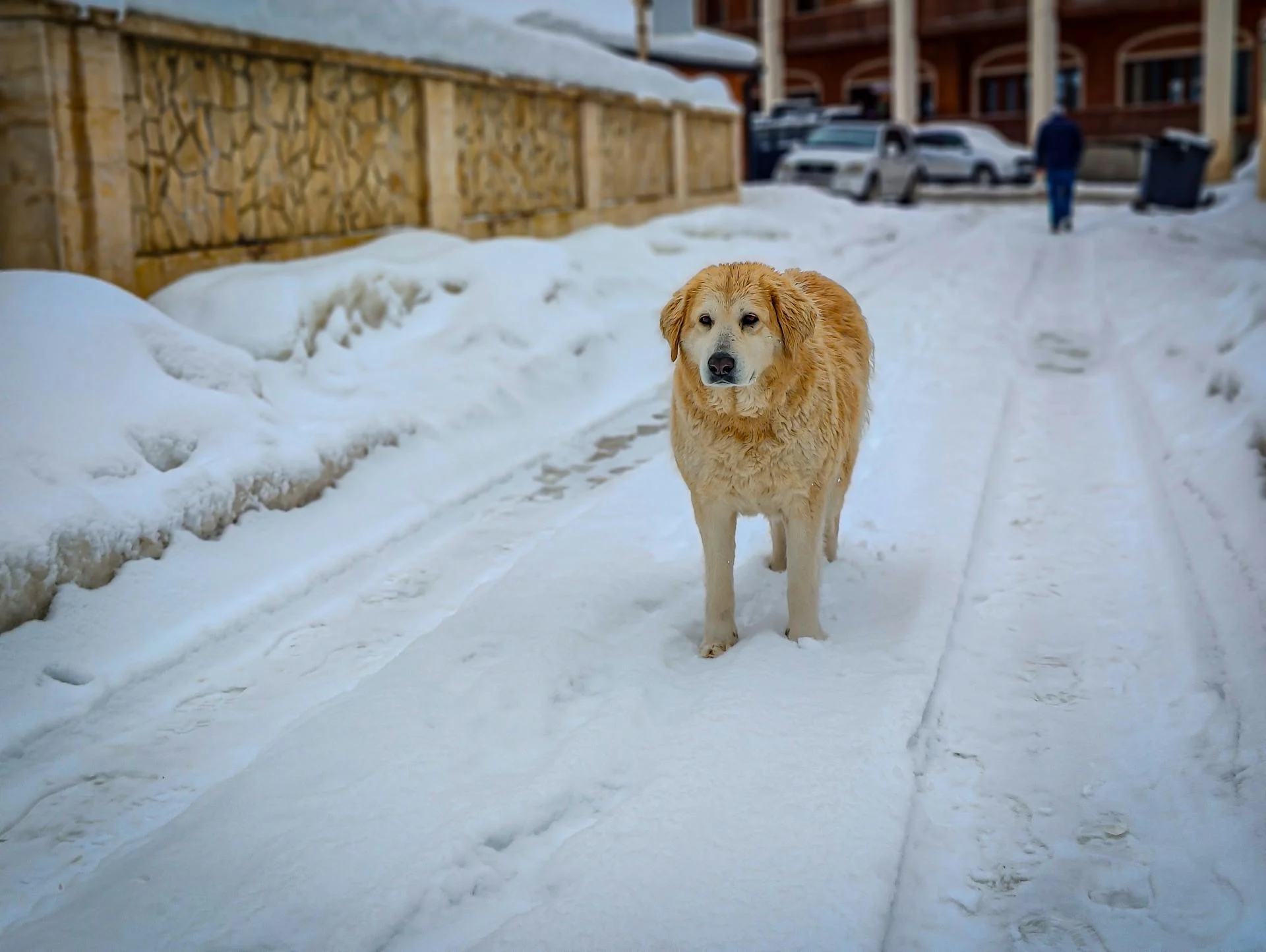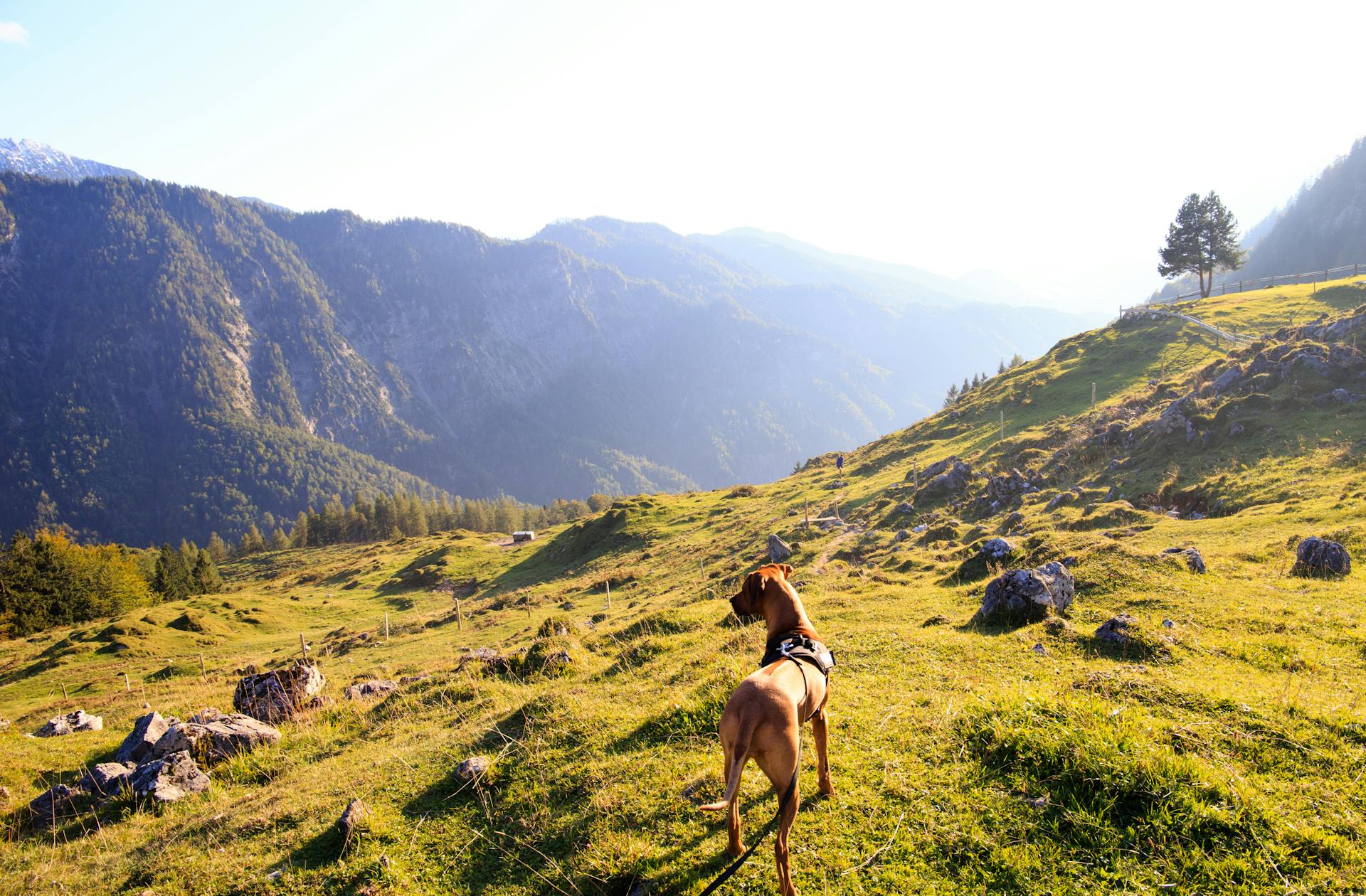
The Great Pyrenees is a breed known for its intelligence and independent nature, which can sometimes lead to stubbornness. They are not pack animals and prefer to think for themselves.
As a result, Great Pyrenees can be challenging to train, especially for inexperienced dog owners. With patience and consistency, they can learn to obey commands.
One key aspect of Great Pyrenees behavior is their strong instinct to protect and defend. This can be triggered by a variety of stimuli, including strangers, other animals, and even family members.
Pyrenees Behavior
Great Pyrenees are natural-born guardians, and their barking is a big part of that job. They bark to scare off predators and alert their pack to potential threats.
Their sensitive hearing allows them to detect even the faintest sounds from miles away, which can lead to frequent barking. They may bark at just about anything, from a stray animal to a tree blowing in the wind.
Great Pyrenees are not "attack" dogs, but rather use intimidation and barking to protect their family and home. They're fiercely loyal and will defend their pack with their lives.
Despite their large size, Great Pyrenees are gentle giants and are often described as "velcro" dogs because of their tendency to stick close to their owners. They love attention and will often try to initiate play or petting.
Their independent streak can make training a challenge, but with patience and consistency, they can learn to obey commands. However, they may take their time to recognize their owner as a leader.
Great Pyrenees are prone to separation anxiety, which can lead to destructive behavior, pacing, and excessive barking or howling. Providing a designated space for them to relax while you're away can help alleviate this issue.
Their intelligence and stubbornness can make training a fun and rewarding experience, but it's essential to find a way to connect with them and make training a positive experience.
Curious to learn more? Check out: Great Pyrenees Potty Training
Health Issues
Degenerative Myelopathy is a challenging path to navigate with your Great Pyrenees. Sadly, it's more common in this breed than in others.
Similar to ALS in humans, Degenerative Myelopathy affects the hind legs, leading to increasing weakness and even paralysis. It's heartbreaking to see your pet struggle with this condition.
While there's no cure, therapies like acupuncture and dietary supplements can make life more comfortable for your beloved pet.
Grooming and Care
Grooming is a must for Great Pyrenees. Their adult coat, which they get around 6-8 months, needs weekly brushings to stay healthy.
A good brush is necessary to pull out the dead undercoat that can prevent proper air circulation. This is essential for their body temperature regulation.
Shaving a Great Pyrenees is not recommended, as it eliminates their ability to regulate their body temperature and greatly increases the risk of sunburn to their fair skin.
Itchy Paws? Allergies
If your dog is constantly paw-licking or face-rubbing, it's time to explore some of the many treatment options available.
Pyrenees often deal with allergies, and instead of sneezing and itchy eyes, they get itchy skin—especially around the feet, belly, and ears.
Itchy skin can be a sign that your dog is suffering from allergies, which can be caused by a variety of things such as environmental factors or food sensitivities.
If your dog is experiencing itchy skin, you may notice them excessively licking or chewing at their paws or face.
You can try to alleviate your dog's allergies by switching to a hypoallergenic dog food or using an anti-itch medication.
Suggestion: Dog Food for Great Pyrenees
Grooming is Essential
Grooming is essential for your Great Pyrenees, especially when they get their adult coat around 6-8 months old. Weekly brushings are a must to keep their coat healthy and functioning properly.
Their coat is remarkable in that it keeps them warm in the winter and cool in the summer. A good brush is necessary to pull out the dead undercoat that can prevent proper air circulation.
Shaving a Great Pyrenees is not a good idea, as it eliminates their ability to regulate their body temperature. It also greatly increases the risk of sunburn to their fair skin.
Trimming the double dew claws on a regular basis is important to keep your pyr's feet healthy.
Here's an interesting read: Do Great Pyrenees Make Good Pets
Pyr Barking: Communication
Barking is a natural form of communication for Great Pyrenees, and they use it to convey various feelings and needs. They can bark to alert you to unfamiliar sounds or sights, protect their family and home, or simply express their energetic personalities.
Great Pyrenees tend to bark more frequently than other breeds due to their lively nature and high intelligence. They're not "attack" dogs, but rather use intimidation through barking and showing off their size to scare off predators.
Low-pitched growls may indicate aggression or fear, while high-pitched barks can signal excitement or playfulness. Your Pyr is trying to tell you something, so listen out for the emotion in their noises.
Barking is often a form of attention, especially if your Pyr has been left alone for a long time. Yelling or punishing them can worsen the situation and reinforce negative behavior.
Great Pyrenees' barking can be used as an expression of their energetic personalities, and they tend to bark more frequently than other breeds. Despite this, excessive barking is not considered normal behavior for this breed.
It's essential to respond appropriately to your dog's barking, as yelling or punishing them can create more problems. By providing mental stimulation and exercise, you can help reduce excessive barking and keep your Pyr happy and healthy.
Pyrenees Quirks and Traits
Great Pyrenees are known for their unique quirks and traits that make them lovable companions. They're a bit vocal, expressing themselves with barks aplenty.
Their intelligence and stubbornness can make training a challenge, but with patience and consistency, they can learn to be great canine citizens. They're also prone to separation anxiety, so it's essential to provide them with a designated space where they can chill while you're away.
Great Pyrenees are naturally protective of their family and property, and they'll bark frequently to warn you of potential threats. However, they can be confused by harmless things like blowing trees, so it's crucial to teach them to distinguish between real and imagined threats. They're also extremely loyal and affectionate, but their independent streak can make them a bit challenging to train.
Suggestion: Why Do Great Pyrenees Bark so Much
Obedience Not a Priority
The Great Pyrenees is a breed that values independence and freedom. They're not designed to follow commands blindly, but rather to think for themselves.
Their independent nature can make training a bit more challenging, as they like to do things at their own pace and on their own time. This means that they may take a while to recognize you as a leader.
Their livestock guardian instincts are strong, and they've been bred to work independently from humans. An adult Pyr doesn't need to be told how to do its job, and this translates to house Pyrs as well. They're not off-leash dogs, and a fence is necessary to keep them contained.
Their independence can lead to roaming, and it's essential to provide them with a securely fenced area where they can safely run around off-leash for short bursts throughout the day. This will help them get the physical and mental stimulation they need to stay happy and healthy.
Their strong will can make them difficult to train, but with the right approach, they can learn to be good canine citizens. It's essential to find a way that works for both you and your Pyr, and to be patient and consistent in your training efforts.
On a similar theme: Great Pyrenees Dog Training
Arthritis to OCD
As you're probably aware, Great Pyrenees can be prone to several bone and joint issues as they age. Keeping your pet at a healthy weight can delay the onset of arthritis.
Stiffness or lameness is a common sign of arthritis in Great Pyrenees, so it's essential to monitor your dog's health closely. Regular weight checks can also help prevent many joint issues.
Hip and elbow dysplasia are two common bone and joint issues that can lead to arthritis in Great Pyrenees. If your puppy grows too quickly, conditions like osteochondritis dissecans (OCD) can occur, necessitating surgery.
For your interest: Great Pyrenees Health Issues
Patellar Luxation
If you notice your Pyrenees hopping or skipping while running, it could be a sign of patellar luxation, where the kneecap slips out of place.
Mild cases of patellar luxation may only require arthritis medication to manage the condition.
In severe cases, surgery is often necessary to realign the kneecap.
Your veterinarian can help you determine the best course of action for your Pyrenees.
Genetics and Temperament
Great Pyrenees have a long history of barking, dating back to 3,000 years ago when they were bred to guard flocks of sheep. Their barking was a way to warn predators away from their flocks.
They were selectively bred for their loud and easily triggered barking, which is why many Great Pyrenees continue to bark today for various reasons.
Living in the mountains, Great Pyrenees had to be vigilant and alert to predators, which has made them naturally protective of their territory and family.
Despite their protective nature, Great Pyrenees are also laid back and great at relaxing. They are patient, reserved, and stoic when there are no threats to be found.
It takes a lot to rile a Great Pyrenees, but they can be particularly disturbed by visitors, especially if they're not announced.
A fresh viewpoint: When to Neuter Great Pyrenees
Frequently Asked Questions
Why do Great Pyrenees paw at you?
Great Pyrenees paw at you as a way to communicate and seek attention, often indicating they're engaged and happy.
Sources
- https://itsdogornothing.com/so-you-want-a-great-pyrenees/
- https://www.pyradigmgreatpyrenees.com/pyr-facts
- https://www.geniusvets.com/pet-care/learn/dogs/breeds/great-pyrenees
- https://www.dogster.com/dog-breeds/do-great-pyrenees-bark-a-lot
- https://juniperpets.com/12-goofy-great-pyrenees-quirks-pyr-behaviors-explained/
Featured Images: pexels.com


